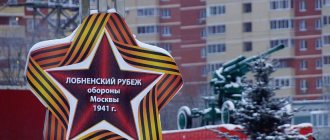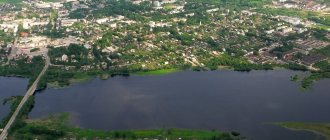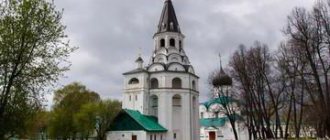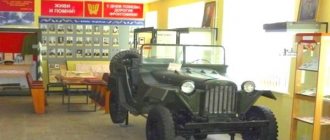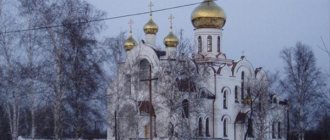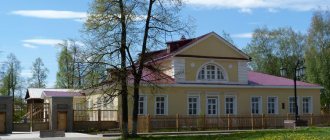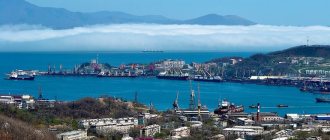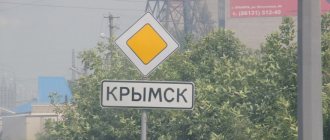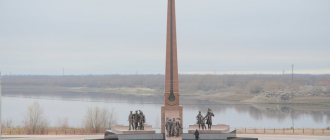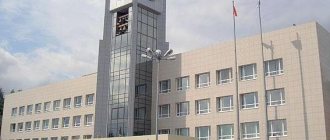General information and history of Votkinsk
The history of the city of Votkinsk is similar to the history of many cities in the Urals. In 1757, Empress Elizaveta Petrovna signed a decree on the construction of an ironworks. The construction of the plant on the Votka River was undertaken by Count Pyotr Ivanovich Shuvalov. The plant acquired its finished form on September 21, 1759.
Votkinsk plant
Industrial production was actively developing, the population of the village gradually increased. The plant administration more than once asked the top management to give Votkinsk the status of a city, but the workers' village was transformed into a city only on August 20, 1935.
Currently, Votkinsk is the administrative center of the Votkinsk region, part of the Udmurt Republic. The city of Votkinsk is located on the Votka River, in the Kama region, 62 km northeast of the city of Izhevsk. The total area of Votkinsk reaches 112 square kilometers.
Votkinsk. View from the pond
Other attractions
Other attractions in the city include the Museum of History and Culture . The building has two floors:
- At the first there is an exhibition dedicated to the main Votkinsk plant, the first workers, as well as the traditions and culture of the city.
- The second floor is dedicated to the nature of Udmurtia, the beauty of which inspired artists and musicians.
In addition to permanent ones, the museum often hosts small traveling exhibitions, as well as musical evenings, celebrations and meetings with famous personalities. The Nikolaevsky building of the Votkinsk plant is considered a significant landmark of the city. It can be viewed from a great distance, since the structure is a high tower located on the territory of the plant.
The building reminds residents of the history of the city, since its appearance has not changed since the founding of Votkinsk. One of the unusual monuments of the past is the Nagornoye Cemetery, located in the city center. This place is always full of visitors who want to see the graves of soldiers and famous personalities buried before the revolution, when Votkinsk was considered a village.
The embankment is also one of the attractions. There is a beautiful alley along the shore, along which tourists and locals stroll on warm evenings. The nature of this place is amazing, so many come here for inspiration.
Ecology and climate of Votkinsk
Of course, the climate of Votkinsk cannot be compared with the hothouse conditions of southern countries. A fairly long winter, during which the temperature can drop to -35°C, is replaced by a short summer, which is not surprising when it comes to the inland climate zone.
It is worth noting that in the summer the thermometer can rise up to 37 degrees (especially over the past few years), which negatively affects not only the functioning of public utilities, but also the health of local residents.
The ecological state of the city deserves special mention. Votkinsk is a relatively small “green” city, so the air in it is very clean. But not everything is so good, because garbage dumps in Votkinsk are a fairly common occurrence, and no one is in a hurry to clean them up. Mountains of garbage can be found not only in secluded places, but also on fairly busy streets. Perhaps this is the main environmental problem of the city, and the fault lies not so much with the utility services, which do not always remove garbage in a timely manner, as with the citizens themselves, for many of whom throwing away a bag of garbage in the wrong place is a common thing.
You can often see a picture like this
Population of Votkinsk
As of January 1, 2014, the population of Votkinsk was 98 thousand people, of which 63% were of working age.
Votkinsk can rightfully be considered a multinational city, because more than 50 nationalities live here. The share of Russians in the city is 83.1%, Udmurts – 9.8%, Tatars – 3.7%, and the remaining 3.4% are representatives of other nationalities. The sad fact is that, according to statistics, the mortality rate in Votkinsk (and in Udmurtia as a whole) is an order of magnitude higher than the birth rate.
Christmas in Votkinsk
In general, the educational level of city residents is not bad, because there are many general and additional education institutions in the city. Of course, the cost of education in higher educational institutions is growing inexorably every year, and the number of budget places is decreasing, however, this is a problem not only in Votkinsk, but also in many other cities.
It is also sad that on the streets of the city you can increasingly see teenagers smoking and drinking (let alone adults), who, in addition, also use obscene language. Despite this, there are many cultural institutions in the city, as well as free clubs for the population of Votkinsk.
Tchaikovsky Estate Museum
The main attractions of the city are places, monuments and houses that are related to the great composer Pyotr Ilyich Tchaikovsky. The monument in Votkinsk was erected not so long ago, but tourists interested in the fate of the famous personality visit it quite often.
It is located in close proximity to the composer's estate museum. Pyotr Ilyich Tchaikovsky was born in Votkinsk in 1840 and spent the first eight years of his life in the village. After this, he was forced to leave his homeland. However, many of the talented man’s contemporaries argued that Pyotr Ilyich wrote a significant part of his works, remembering and reliving his happy childhood years, admiring the nature of his native land .
The estate museum is located on the shore of the pond. It was in this house that the future composer was born. Today, the building preserves all the furniture and other items that were used by the Tchaikovsky family. Every year it hosts a music festival dedicated to classical music. The museum itself is open to visitors who want to plunge into the atmosphere of the century before last.
The main item in the house is the piano, which Peter Ilyich himself learned to play. During the tour, visitors have the opportunity to enjoy the composer's works. You are also allowed to take a walk along the shore of the lake, observing the nature that inspired Tchaikovsky to write the work “Swan Lake”. In addition, visitors look at photographs, touch antique furniture and other objects, and for a moment become immersed in the world of the composer.
Districts and real estate of Votkinsk
Votkinsk is a relatively small city, but officially it is divided into as many as nine districts. In 1998, the City Duma determined the boundaries and approved the names of seven districts of the city, and in 2009, the formation of new elements of the planning framework increased the number of planning districts to nine.
In the northern part of the city there is the Berezovka district, which borders on the Central and Eastern districts. To the south are such districts as Plodopitomnik, Zarechny and Privokzalny, and in the southern part of the city the districts of Selkhozkhimiya, Vogulka and, of course, Yuzhny have found their place.
Votkinsk map
It's time to get to know the city's districts better, consider their unofficial names and assess their living conditions.
central District
Actually, the name of the area speaks for itself. The main attractions of the city and the oldest city buildings are located in the center of Votkinsk. Thus, many houses in the Central District were built more than a hundred years ago. Of course, the condition of many of them leaves much to be desired, but timely repairs help keep the district’s buildings “in shape.”
The average cost of a one-room apartment in the Central region is about 800-900 thousand rubles. Not so little for Votkinsk, but this is not surprising, because in the city center there are cinemas, numerous shops, entertainment venues, in general, all the most interesting things happen here.
It is worth noting that there are many private wooden houses in the Central region. Over time, of course, many of them become uninhabitable. In their place, either stone residential buildings or various offices and shopping centers are built. Part of the Central region received the unofficial name “Sands”. This place can be called the busiest in the city, because here is the main shopping point of Votkinsk - the city market.
Central district of Votkinsk
Station area
Not far from the city center is the Station District, which is popularly called the “Second Village”. The district owes its official name to the railway station.
Residential buildings here are newer than in many areas of the city, which is why the average cost of a one-room apartment in the Station District is about 1,500 thousand rubles. Such a high cost of housing is explained not only by the newness of the area, but also by its proximity to the city center. And, if in the Central District 4- and 5-story residential buildings predominate, then in the Second Village, mainly 9-story buildings are being built.
The station area is located on a hill, so many places offer beautiful views of the city.
Station area
Eastern region
The eastern region previously bore the official name “Nefterazvedka”. Not surprisingly, most of the city's population still uses the old name for the area. Here you can find both wooden private houses and 5- and 9-story residential buildings. The area cannot be called old, but due to some distance from the central part of the city, the cost of apartments here is slightly lower than in other areas.
It is worth adding that many streets in the private sector of this area do not have asphalt, so making your way through Nefterazvedka, especially in the spring, is not very pleasant. At the top of the mountain in the Eastern District is the St. George Orthodox Church, which is visible from almost anywhere in the city.
Temple of St. George the Victorious
Berezovka
Of course, it can rightfully be called the “greenest” district of the city, as evidenced by its name. Local residents divide Berezovka into Upper and Lower. This area is ideal for lovers of a quiet and peaceful life: forest, pond, fresh air... What else is needed for happiness? The houses here were built about 50 years ago, but Berezovka does not lose its popularity, so a 1-room apartment will cost lovers of silence 700-800 thousand rubles.
Votkinsk. Berezovka
Fruit nursery and Zarechny
These are neighboring areas, popularly called “Konanok”. There is no place for multi-storey residential buildings here, because almost the entire territory is filled with private wooden houses, which over time give way to stone analogues. A good option for those who dream of having their own vegetable garden under the window and do not want to adapt to the bustle of the city. A similar picture is observed in the Selkhozkhimiya region.
Typical house of Zarechny
Southern District and First Village
The Southern District, which is popularly called the First Village, also deserves special mention. Many houses here were built relatively recently, but due to the distance from the central part of the city, the cost of housing here is an order of magnitude lower than in other areas. Vogulka borders the First Village - a small area, significantly remote from the city center, with private wooden houses.
Votkinsk monuments and sculptures
A special decoration of the city are sculptural compositions dedicated to significant historical events and outstanding personalities.
Monument to P.I. Tchaikovsky
- Address: Tchaikovsky Park.
A monument to the famous composer was erected in front of the entrance to the Estate Museum, where he spent his childhood. Cast in bronze, Pyotr Tchaikovsky sits on a bench. His face is thoughtful and concentrated, as if he is listening to his soul, in which the first notes of another masterpiece of musical art are born. The sculpture is placed on a granite pedestal. The backdrop is a leafy alley and the green shore of a pond.
Monument to Vysotsky
- Address: square named after V.S. Vysotsky.
In September 2021, one of the Votkinsk squares was named after Vladimir Vysotsky and became the site of a monument to the great Soviet poet. The author of the sculpture, Alexander Suvorov, made a lot of efforts to give the image of Vysotsky cast in metal maximum resemblance to the original. He depicted him in a dashing pose with a guitar on his chest.
The guests of honor at the opening ceremony of the monument and public garden were Nikita Vysotsky (son of a musician) and Alexander Solovyov (head of Udmurtia). At the end of the ceremony, they planted a blue spruce in the park.
Memorial of Military Glory
- Address: Central Square.
The monument to the participants of the Great Patriotic War is a 17-meter-tall obelisk in the shape of a dagger. The stone statue is decorated with bas-reliefs of the Order of St. George the Victorious and the Order of Victory.
The memorial is the custodian of a time capsule. The first message was laid down by young Votkinsk residents in the 1970s. It was opened in the fall of 2018 and read out at a ceremonial meeting. On a piece of paper that lay underground for almost half a century, the Komsomol members’ oath was written to maintain friendship, peace and strengthen the power of the Motherland. Along with the letter, the capsule contained metal containers with soil from the hero cities: Stalingrad, Smolensk and Brest.
After reading the message, a new capsule was placed in its place, which must be opened by the generation of 2043. At the end of the meeting, the message to the future was covered with a marble slab, and red carnations were laid at the foot of the monument.
City infrastructure
The condition of the housing and communal services complex in Votkinsk is generally satisfactory. In summer, many areas practice turning off hot water due to maintenance work, but this phenomenon can be observed in many other cities. There are also power outages, but accidents are usually resolved quickly enough. The city is small, so the cost of utilities is corresponding. Thus, the owner of a two-room apartment costs 1,500-2,000 rubles per month for accommodation.
A few words about the condition of the city's road surface. It's no secret that Russia is “famous” for its terrible roads. Votkinsk is no exception in this regard, because even on the central streets, driving around the city sometimes turns into a complete overcoming of obstacles. Of course, work is underway to restore roads, but their scale is not comparable with the scale of the road surface, which is unsuitable for driving.
Despite the fact that the number of cars in the city is constantly increasing, there are practically no traffic jams here. More than 70 buses appear on city routes every day, with the share of social public transport being about 50%. In Votkinsk you can also use taxi services, which have recently become increasingly popular.
The network of educational institutions in the city is quite extensive; it includes 31 preschool educational institutions, 16 secondary schools, 1 orphanage and 6 additional education institutions.
Enterprises and work in Votkinsk
Votkinsk is an industrial city and occupies one of the key places in the economy of Udmurtia. In total, there are about 1,000 enterprises and institutions located in the city, but the main one is Votkinsky Plant OJSC. The share of the plant's products exceeds 70% of Votkinsk's industrial production as a whole. In total, this enterprise employs about 25% of the city’s employed population. It is worth noting that the plant’s equipment is constantly being improved, so we can say with confidence that the city-forming enterprise keeps up with the times.
Checkpoint of the Votkinsk plant
Large enterprises in Votkinsk also include Tekhnovek Oil and Gas Equipment Plant LLC, Votkinsk Bread Factory OJSC, OJSC "and others."
In the industrial production of Votkinsk, the key place is occupied by mechanical engineering and processing (about 85% of total production), the food industry accounts for 9.8%, 0.8% is occupied by the production of building materials and 4.4% by other industries. 90% of industrial products are produced by large and medium-sized enterprises, small businesses account for only 10% of production.
The city's enterprises specialize in the production of special equipment, equipment for the oil and gas industry, equipment for the nuclear industry, gas stoves, metal-cutting machines, gearboxes, consumer goods and much more.
The average salary in the city in 2010 was 15,498 rubles (in industry - 19,573 rubles). It is worth noting that in 2006 the average salary was almost 2 times less. The highest rates of wage growth were observed in 2006-2008. The unemployment rate in the city is extremely low, the share of unemployed citizens is only 1.27%, which is the lowest figure in the republic.
Famous monuments
Among the attractions of Votkinsk, not only the Tchaikovsky monument deserves attention. You can visit places where monuments of value are located:
- The Anchor monument is not only a landmark of the city, but also one of the symbols of Russia. Its significance can be understood if you study the history of the development of the Votkinsk plant and its contribution to the industry of the city. The weight of the anchor reaches 167 pounds; it was made in 1837. On the front side there was an inscription carved that Alexander II took part in the forging. On the back there was an engraving indicating that the monument was forged at a time when the plant was ruled by Ilya Petrovich Tchaikovsky, the father of the famous composer.
- On the territory of the Votkinsk plant there is a monument to a ballistic missile, the height of which reaches 15 meters. The object is considered closed, so it is not allowed to come close to it. On the plate attached to the pedestal, you can read the technical characteristics of the rocket.
- Not far from the Votkinsk House of Culture there is a square in which there is a monument to Vysotsky, cast in bronze. Experts managed to quite accurately convey the features of a famous person. The initiators of the installation of the monument were ordinary people who respect Vysotsky’s work.
One of the unusual monuments of the city is the Ovchinnikov Tower. This house belonged to a forester, who himself developed the project and took part in the construction. The tower is one of the few buildings that have survived unchanged to this day.
Crime
The crime situation in Votkinsk is relatively calm (the key word here is “relatively”). Of course, crimes are not uncommon here, but they are usually of a domestic nature. In most such cases, the cause of the crime is disagreement between friends or cohabitants that arises while intoxicated.
As in any other city, thefts, robberies and other crimes periodically occur in Votkinsk, but the city is small, so there are not many serious incidents.
However, more high-profile cases also happen. Thus, in 2011, a criminal gang was detained in Votkinsk, whose members had been planning and committing robbery attacks for 8 years. They accounted for the lives of 6 truck drivers and 3 businessmen. At night in some areas you should be extremely careful on the streets, because there you can often meet drunken companies of young people who are usually not in the most friendly manner.
It is sad to realize that many crimes are committed by persons under 18 years of age. For example, not long ago, a 16-year-old teenager, while heavily intoxicated, inflicted fatal injuries on a young man born in 1987.
Time capsule
Votkinsk is also famous for its time capsule, which was opened in October 2021. The youth of the city founded it back in 1970, placed a description of things and a message to those who find and open it.
In addition to the things, the Obelisk of Glory, opened at the same time as the capsule, contained three containers containing the sacred soil of Smolensk, Brest and Stalingrad. The young people in their message called on people from the future to honor their ancestors, respect those who took part in the revolution, and not forget the events of the past that significantly influenced the present.
The opening was attended by city residents of all ages, as well as the city mayor, archive staff and heads of technology departments. After studying the message from 1970, two new letters and some things were put into the capsule. It was again placed under the obelisk and covered with a slab. In addition, a sign was attached to the monument indicating that the capsule must be opened on October 29, 2043.
The entire event was filmed and many photographs were also taken. The materials were sent to the archive, where there is already other documentation on the modern history of the Udmurt Republic, as well as interesting facts from the past.
(
2 ratings, average: 3.00 out of 5)
